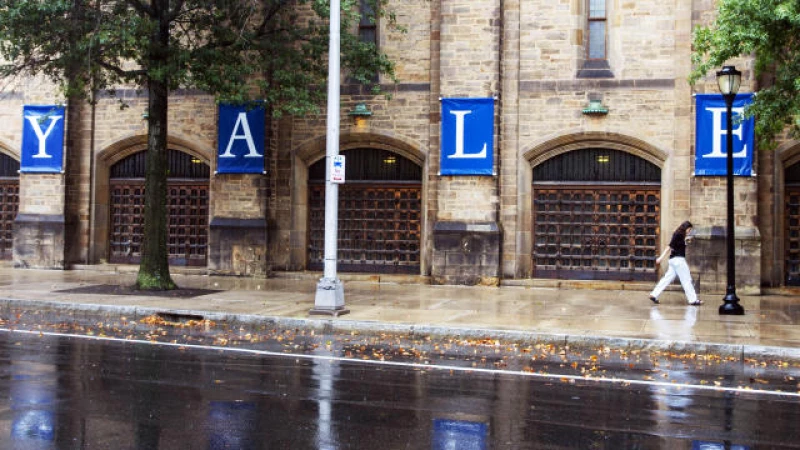Protesters demanding Yale University divest from military manufacturers and expressing "solidarity with Gaza" amid the ongoing war between Israel and Hamas were arrested Monday after officials said they refused to disband an encampment on campus. Demonstrations then spilled out into the streets of New Haven, Connecticut.
For the last several days, a pro-Palestinian protest group called "Occupy Beinecke" erected a 24-tent encampment outside of Yale's Beinecke Plaza. In a statement on Instagram, the group said the encampment was also in solidarity with the recent protests at Columbia University, which resulted in multiple arrests last week and this weekend. In Boston, MIT and Emerson College campuses also saw student protests.
At Yale, university and New Haven police officers removed the protesters camped outside the Schwarzman Center on Monday and blocked entry to Beinecke Plaza. The demonstration spilled onto the streets of New Haven, where Yale's campus is located, about 80 miles north of New York City.
Video posted on social media showed students marching down Grove and College Streets, chanting and cheering.
Police arrested 45 protesters on Monday. In a statement to CBS News, a Yale spokesperson said the university repeatedly asked the protesters to vacate the plaza and when many did not leave voluntarily, they were arrested. The spokesperson said the students who were arrested will also be referred for Yale disciplinary action, which includes a range of possible sanctions including reprimand, probation and suspension.
In a statement, the New Haven Police Department confirmed it assisted the university police officers around 6:30 a.m. on Monday. It said the people arrested were charged with criminal trespass, a misdemeanor. They were taken to a Yale police facility, where they were processed and released.
The police department said as long as the protest at Grove and College Streets remains peaceful, there were no plans to make any additional arrests.
"It's ludicrous that students are being charged with criminal trespassing for peacefully protesting on their own campus," Chisato Kimura, a Yale Law Student, said, according to a statement released by Occupy Beinecke.
The ongoing demonstration arose after Yale's Advisory Committee on Investor Responsibility decided that military weapons manufacturing for authorized sales did not "meet the threshold of grave social injury, a prerequisite for divestment."
The group's so-called occupation of Beinecke Plaza, which was the location for Yale student protests during the divestment campaign against South African apartheid in the mid-1980s, began last week when students placed dozens of books outside the Schwarzman Center.
A university spokesperson said officials spent several hours with student protesters on Sunday, offering them the opportunity to meet with trustees, including the chair of the Corporation Committee on Investor Responsibility, but the offer was declined.
According to Occupy Beinecke organizers, they declined the meeting because they said it "would not be productive unless students and trustees had equal access to information on Yale's holdings."
On Sunday, Yale University President Peter Salovey issued a statement on the protests, saying that the university supports free speech and civil discourse and also must focus on campus safety and maintaining university operations.
A Jewish Yale student reported over that weekend that she was struck in the eye by a flagpole wielded by a protester waving a Palestinian flag. She said she was treated at a hospital and is recovering.
According to Salovey, university officials have engaged in discussions with demonstrators regarding the necessity of adhering to school regulations and protocols.
"The erection of structures, defiance of directives from university authorities, prolonged occupation of campus areas beyond designated times, and other actions that contravene university policies and guidelines pose safety risks and disrupt the operations of our institution," he stated.







